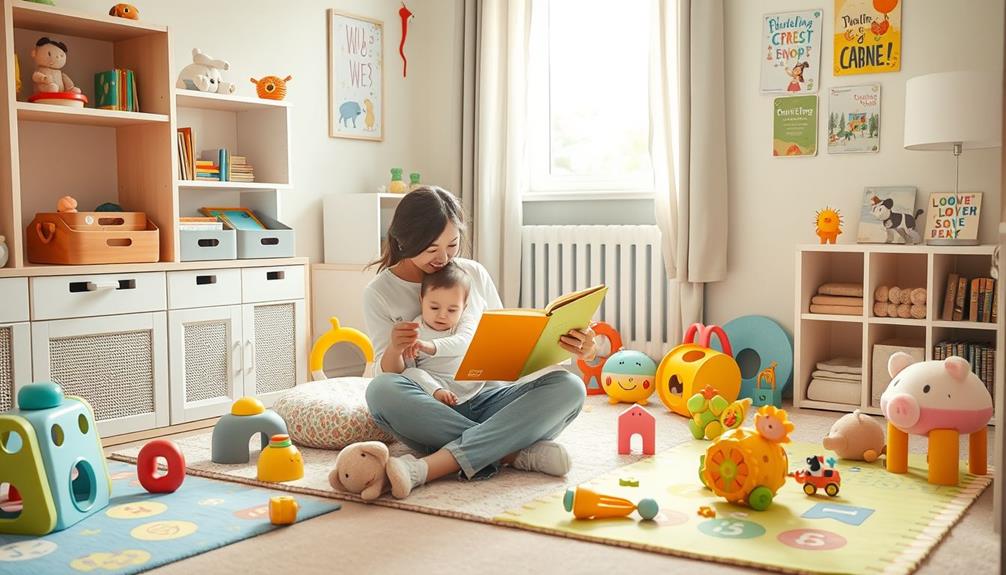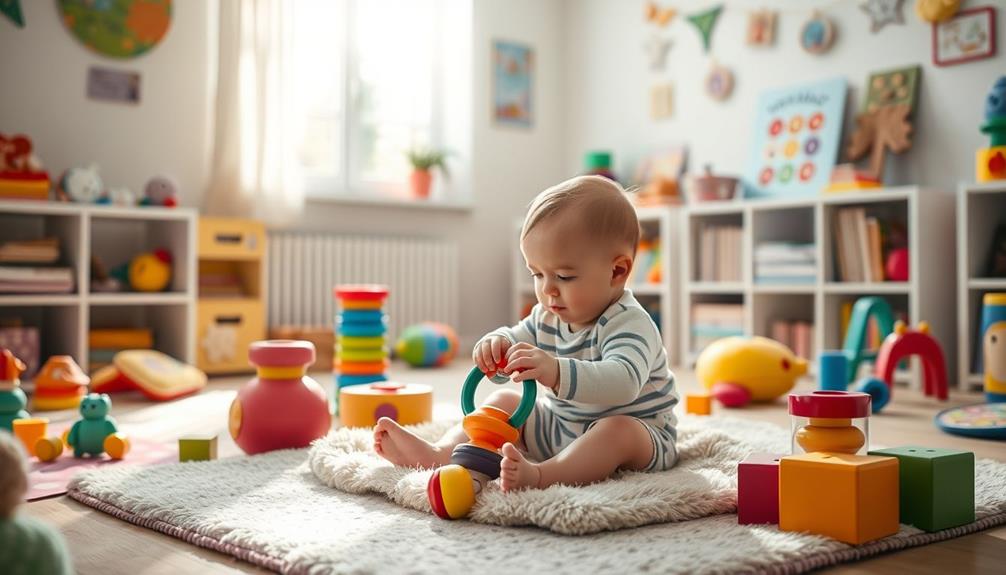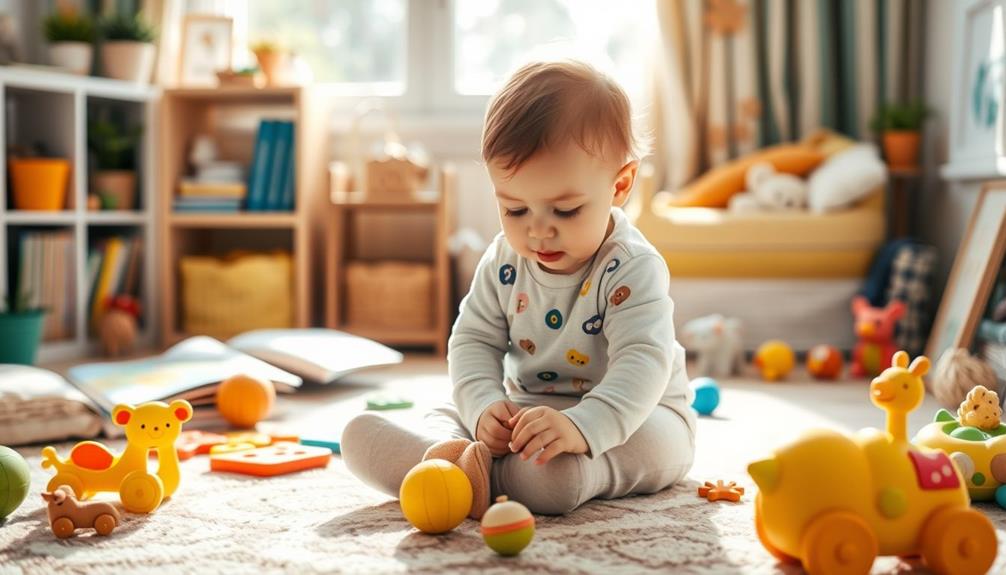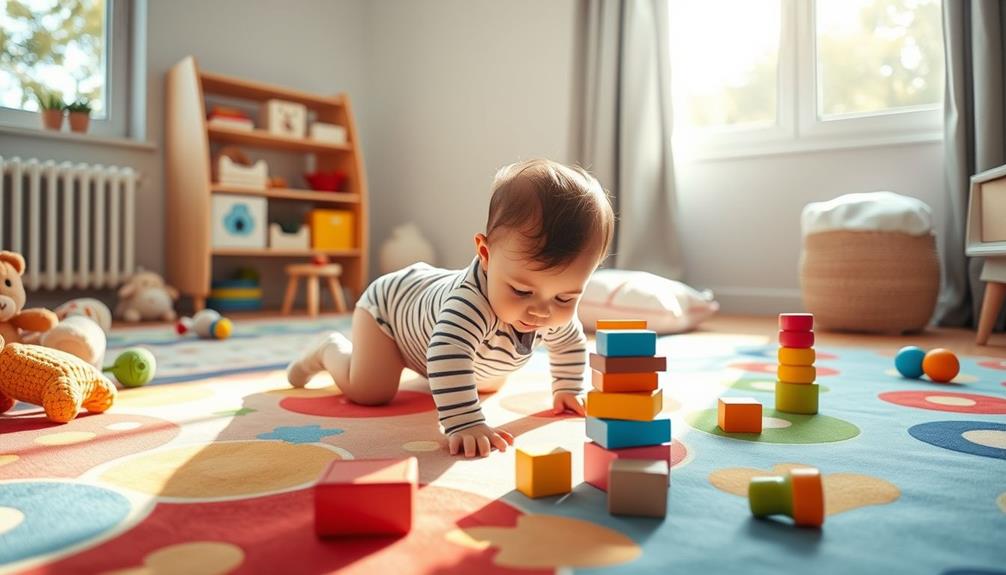To identify and nurture intelligence in babies, start by observing their unique strengths and interests. Recognize signs like early language skills or advanced motor abilities, and tailor your activities accordingly. Engage in interactive reading sessions to strengthen language development, and encourage creative play to foster problem-solving skills. Provide a supportive environment free from excessive screen time, allowing hands-on experiences that stimulate curiosity. Setting realistic expectations helps you monitor growth without pressure. Celebrate small milestones to build confidence and motivation. There's so much more you can explore about nurturing your baby's intelligence and recognizing their potential.
Key Takeaways
- Observe your baby's alertness and curiosity to identify their dominant intelligence, such as exceptional observation skills or exploration tendencies.
- Engage in interactive reading sessions to stimulate verbal-linguistic intelligence and foster a love for language from an early age.
- Encourage creative play with everyday items to promote problem-solving skills and exploration aligned with bodily-kinesthetic and mathematical-logical intelligences.
- Provide gentle movements and music activities to enhance physical and emotional development, supporting overall cognitive growth.
- Set realistic expectations based on developmental timelines, celebrating small achievements to nurture confidence and motivation in your baby's growth.
Understanding Different Types of Intelligence
Understanding the various types of intelligence is vital for nurturing your baby's unique potential. Howard Gardner's theory identifies nine types of intelligences, such as bodily-kinesthetic, verbal-linguistic, and mathematical-logical. Each child has a dominant intelligence that shapes their unique strengths and learning style.
Recognizing these individual differences is important during early development, as it allows you to tailor experiences that nurture their specific talents. Incorporating elements of healthy kid play can further enhance these experiences, as play is fundamental for cognitive and social development.
Encouraging your baby to explore various activities can greatly impact their brain development. When you provide opportunities that align with their intelligence types, you foster an environment where they can thrive. For instance, if your child shows a knack for verbal-linguistic intelligence, reading books or engaging in storytelling can enhance their skills.
Alternatively, for those with bodily-kinesthetic intelligence, activities like dancing or playing with building blocks can stimulate their growth.
Being patient and supportive as your child discovers their strengths will help them navigate their learning journey. Remember, every child is unique, and embracing their individual intelligences will set a strong foundation for their future learning and development.
Parenting Strategies for Development

Nurturing your baby's development requires intentional parenting strategies that cater to their unique strengths. By closely observing early signs of your child's development, you can identify their high level of alertness and tailor your approach accordingly.
Engaging in regular reading not only enhances emotional and intellectual growth but also instills a love for learning early on. Additionally, understanding the importance of mental health support can play a significant role in fostering a nurturing environment for your child.
To help your child thrive, create a supportive environment filled with creative and educational activities. Utilize everyday items to stimulate problem-solving skills and encourage curiosity.
Regularly assess your baby's strengths and weaknesses to make informed decisions about which activities best support their developmental milestones. Consulting with pediatricians can also provide valuable insights into your child's individual growth trajectory, ensuring that you're addressing any developmental concerns.
Activities to Stimulate Growth

Engaging your baby in stimulating activities is vital for their growth and development. Start with interactive reading sessions, even before birth, to boost their language development and cognitive skills. This sets the stage for vocabulary acquisition right from an early age.
Incorporate creative play by using everyday items like pots and pans for percussion or cardboard boxes for imaginative adventures. These activities will foster problem-solving skills and encourage exploration. Additionally, consider incorporating gentle movements and stretches, as they can enhance physical development and coordination, similar to yoga for back pain management.
Don't forget the power of music and singing; they contribute greatly to emotional and cognitive development by activating brain areas linked to language and memory.
It's also imperative to limit screen time and prioritize hands-on experiences, like playing with developmentally appropriate toys. This promotes active learning, allowing your baby to master skills more effectively.
Encourage curiosity by asking open-ended questions and letting your little one explore their environment. This nurtures a love for learning and helps develop critical thinking and complex problem-solving skills.
Recognizing Signs of Intelligence

As you participate in activities that stimulate your baby's growth, keep an eye out for signs of intelligence that can emerge during this early stage of development. Recognizing these signs can help you nurture their cognitive abilities effectively.
| Sign | Description | Example |
|---|---|---|
| Alertness | Exceptional observation skills | Quickly noticing new sounds |
| Advanced Motor Skills | Rolling over or walking earlier than peers | Crawling before six months |
| Language Skills | Early babbling and larger vocabulary | Forming simple sentences |
| Curiosity | High levels of exploration and questioning | Trying to reach for new objects |
| Problem-Solving | Using imaginative strategies to overcome obstacles | Figuring out how to stack blocks |
Setting Realistic Expectations

How can you guarantee that your expectations align with your baby's unique development? Start by understanding that every child grows at their own pace.
Establishing realistic expectations, like sitting up by six months or speaking simple sentences by 14 months, provides a framework to monitor progress effectively. It's vital to familiarize yourself with typical development timelines to set healthy benchmarks. Engaging in family activities that promote creativity can further enhance your child's development, making the journey more enjoyable for both of you, as it helps cultivate digital creativity in a supportive environment.
Encouraging your little ones means celebrating their small achievements, which fosters motivation and confidence. This positive reinforcement helps them perform better and nurtures their strengths and weaknesses.
Remember, some children might reach milestones earlier than others, and that's perfectly okay. Avoid comparing your child to peers, as this can create unnecessary pressure on both of you.
Instead, focus on providing exposure to various experiences that can stimulate growth. By creating a supportive environment, you can nurture intelligence without the stress of unrealistic expectations.
Ultimately, patience is key. Monitor progress without rushing, and you'll find a joyful journey in watching your child develop at their own unique pace.
Frequently Asked Questions
How to Tell if a Baby Is Intelligent?
You can tell if a baby is intelligent by observing their early developmental milestones.
If they sit up independently or speak clearly before their peers, that's a good sign.
Notice their focus; if they can engage with toys or books for long periods, it shows concentration.
Look for problem-solving skills, like reaching for hidden objects, and pay attention to their curiosity.
Complex questions and a desire to explore indicate a strong cognitive drive.
How Do You Test an Infant's Intelligence?
To test an infant's intelligence, observe their milestone achievements, like sitting up or speaking clearly.
Engage with them through reading and singing to assess responsiveness and language skills.
Watch how they solve problems, such as maneuvering toys, to gauge their cognitive engagement.
Track their attention span during playtime, noting how long they focus.
Regularly consult with pediatricians to monitor their developmental progress and identify areas of concern related to their intelligence.
What Is the Best Predictor of Infant Intelligence?
When you think about the best predictor of infant intelligence, consider early milestone achievements. If your baby sits up or speaks clearly before the usual age, it often signals advanced cognitive abilities.
Also, pay attention to their alertness and concentration levels; these traits can indicate higher intelligence. Engaging in imaginative play and exposure to multiple languages during infancy can further enhance cognitive growth, setting a strong foundation for their intellectual development.
What Determines Intelligence in Babies?
Imagine planting a seed in fertile soil; it needs sunlight, water, and care to thrive.
Similarly, a baby's intelligence blossoms from a mix of genetics and environment. Factors like birth weight and prenatal nutrition play crucial roles, while early exposure to language and interactive play nurtures cognitive growth.
Just as a garden flourishes with attention, your involvement and nurturing can shape the unique intelligence of your little one, helping them reach their fullest potential.
Conclusion
In nurturing your baby's intelligence, remember that each child's journey is unique. Embrace the moments—like watching your little one's eyes light up as they discover something new. By recognizing their strengths and engaging in stimulating activities, you'll help them flourish. Stay patient, set realistic expectations, and enjoy every step of this incredible adventure. After all, in the grand tapestry of life, these early years are the threads that weave the future.










